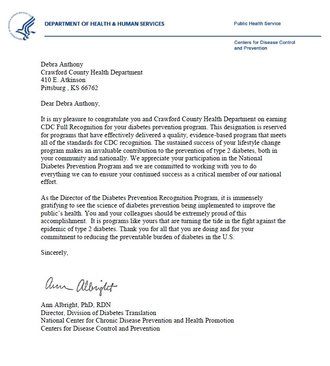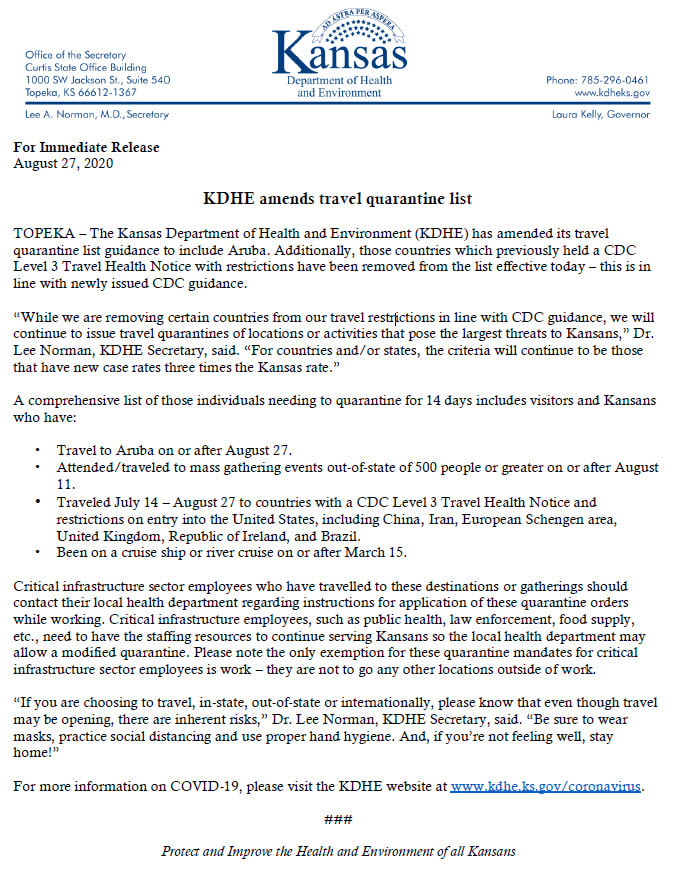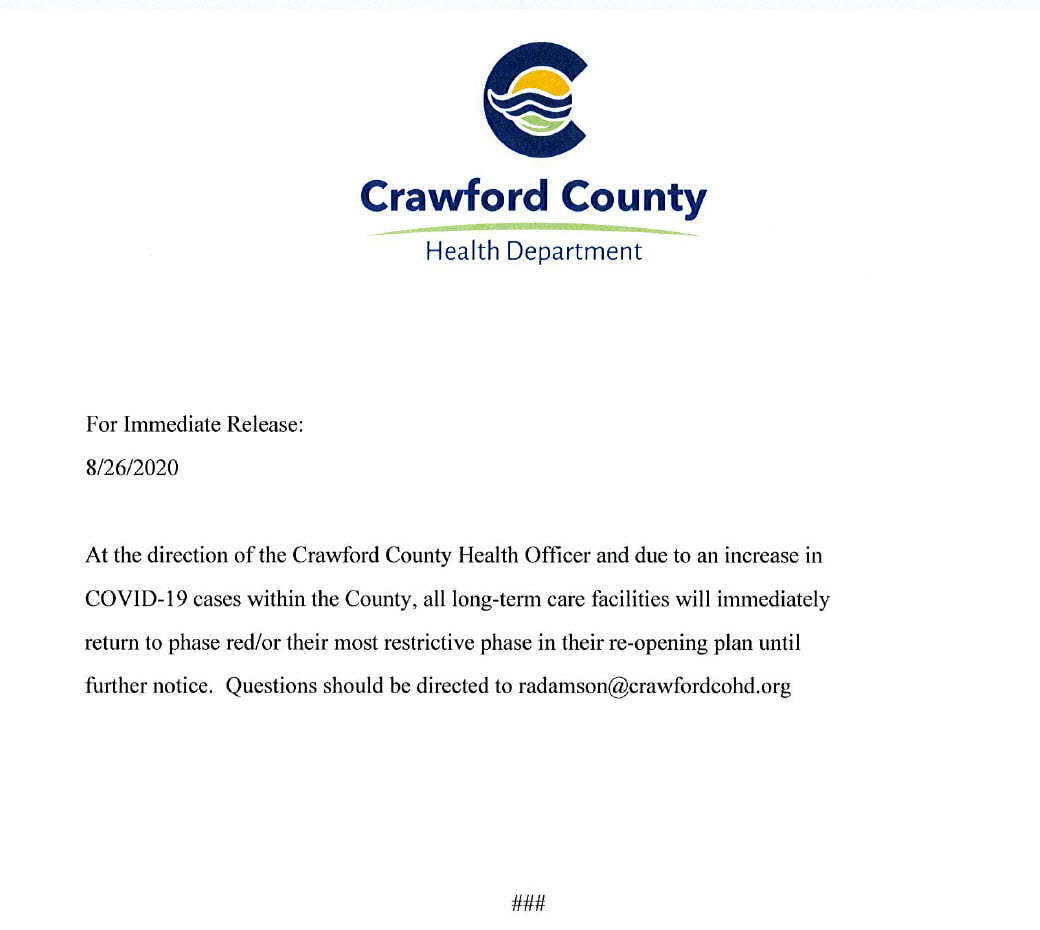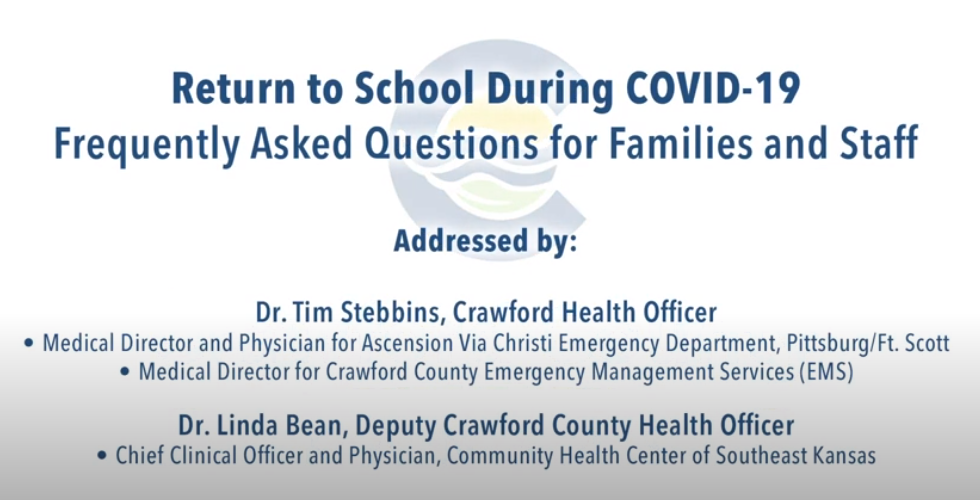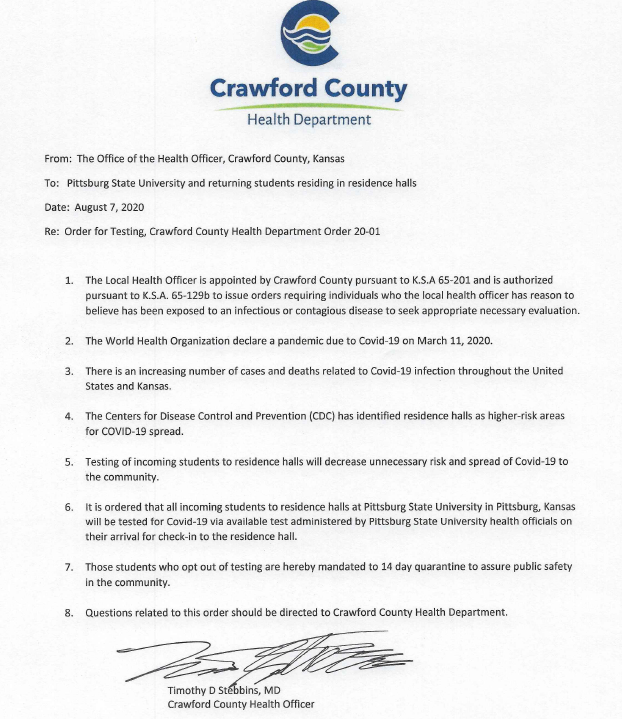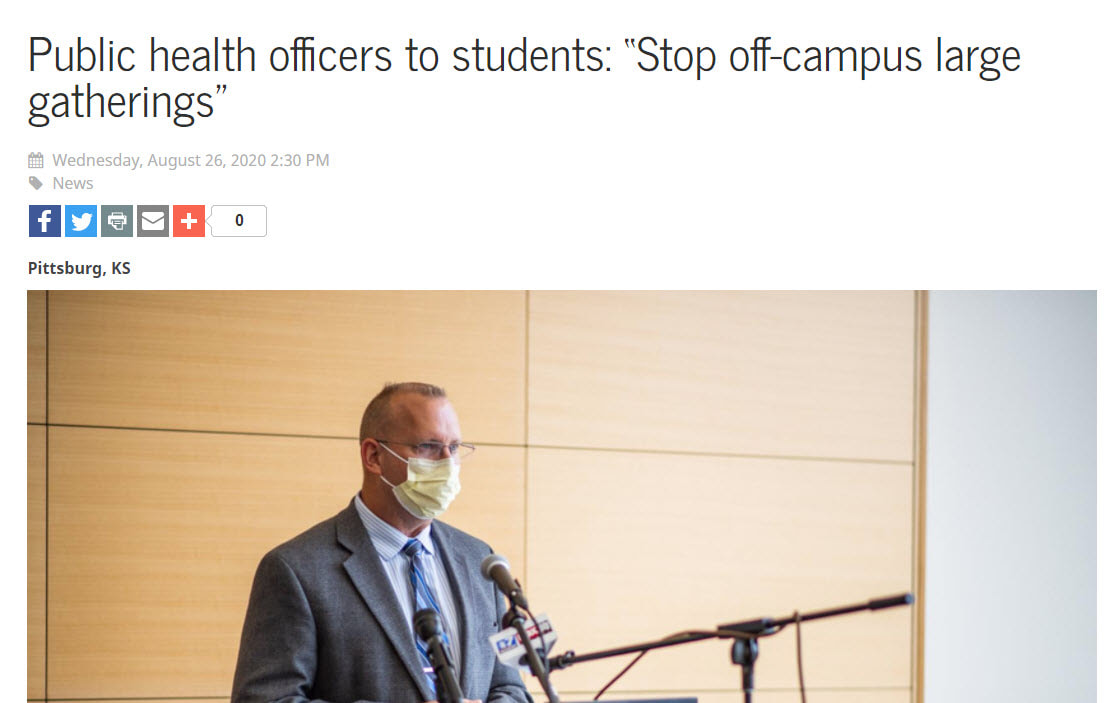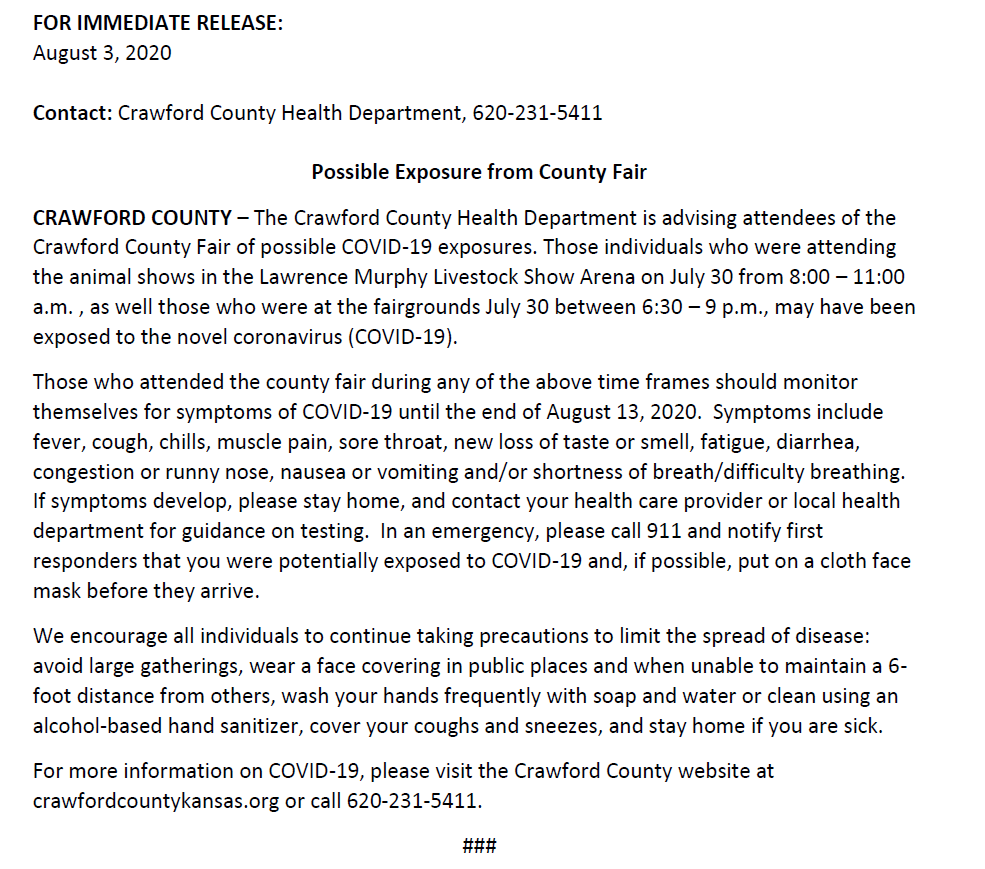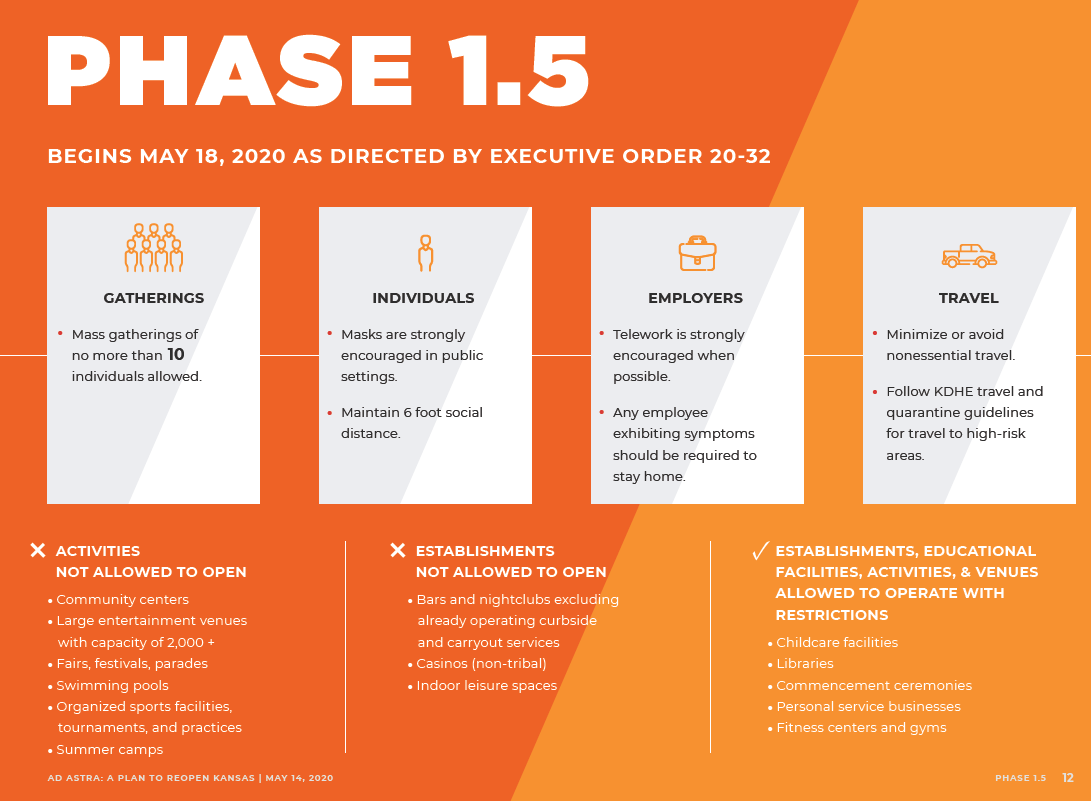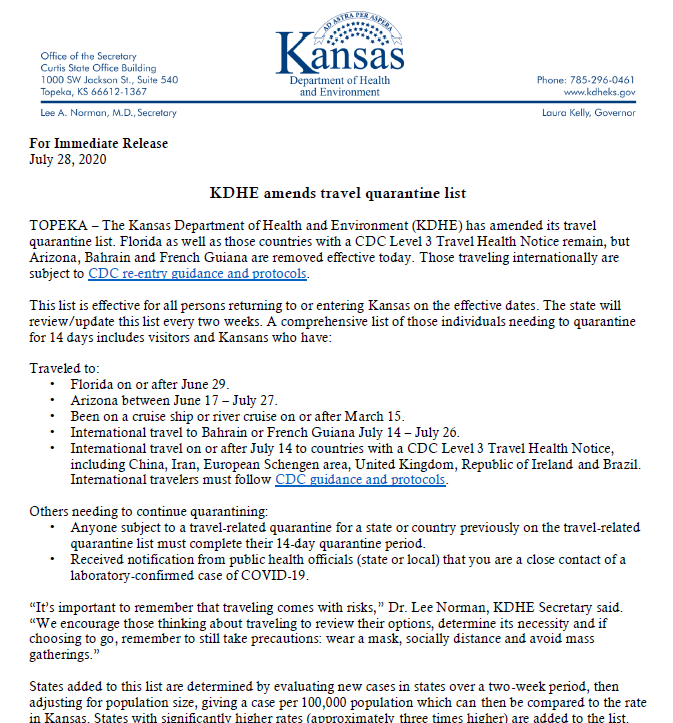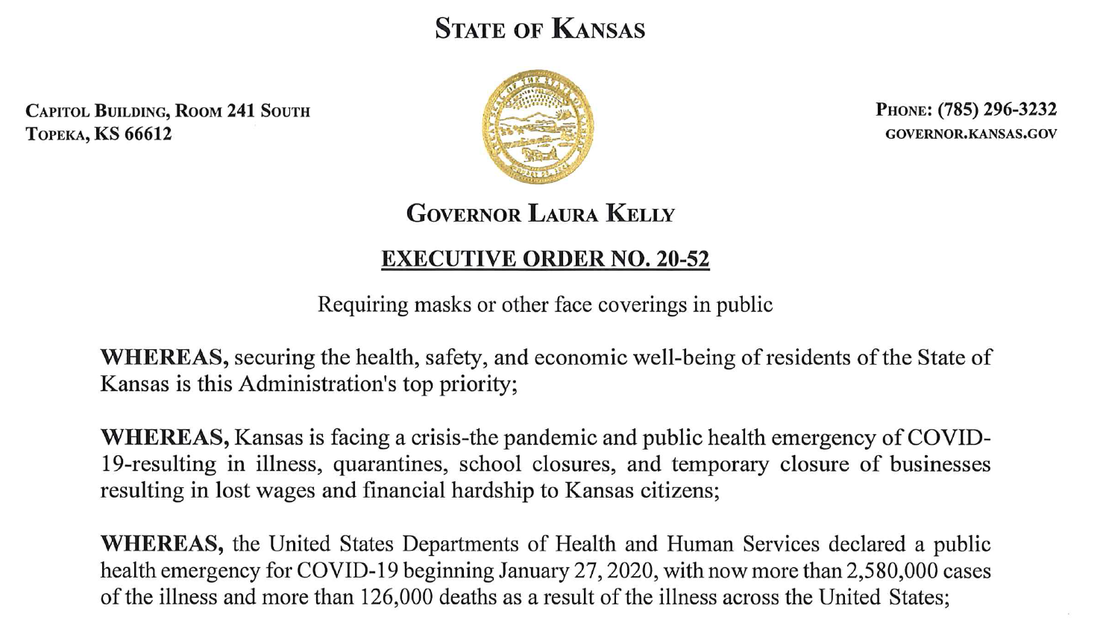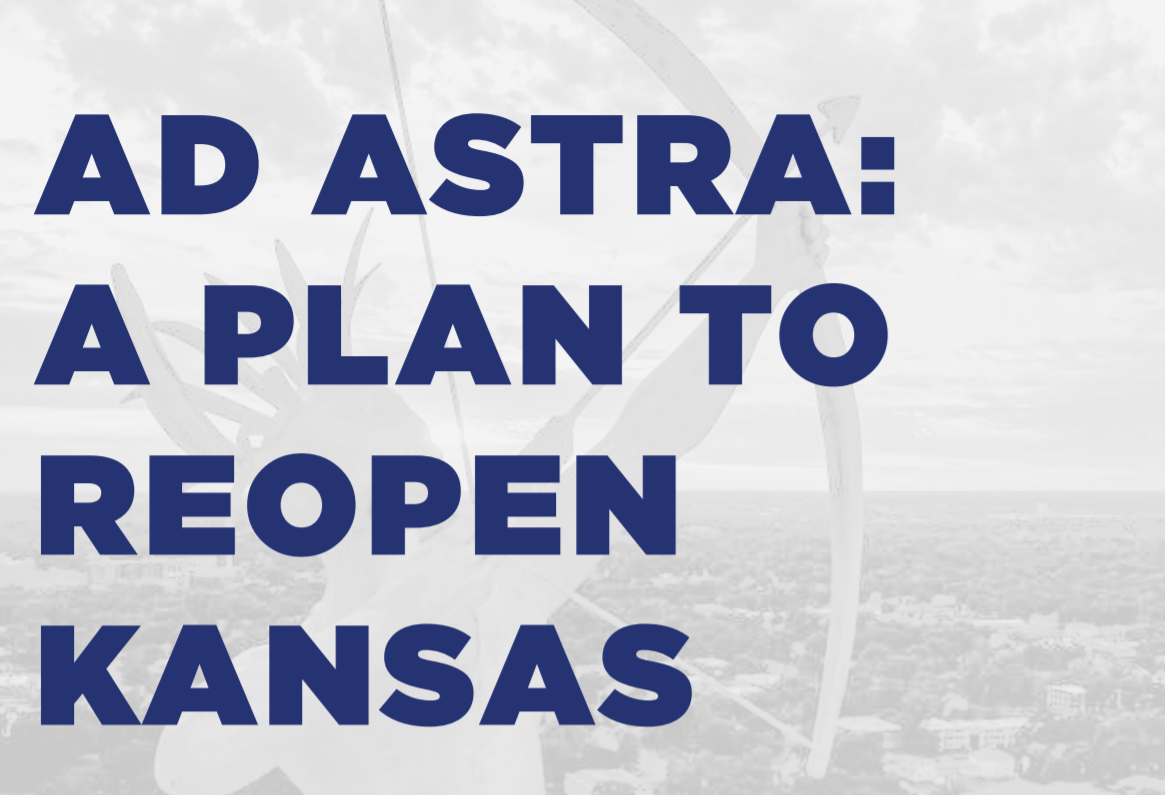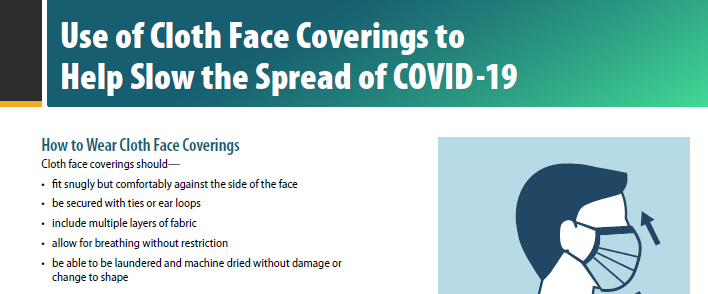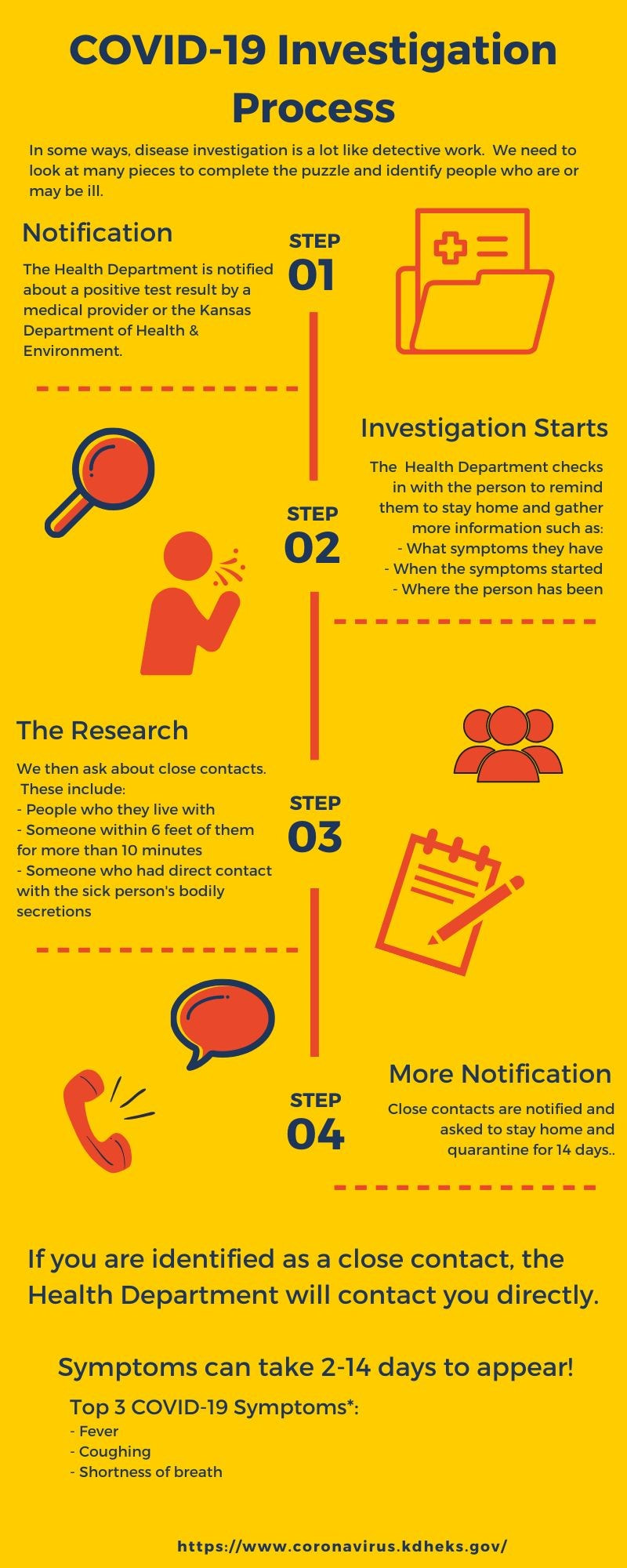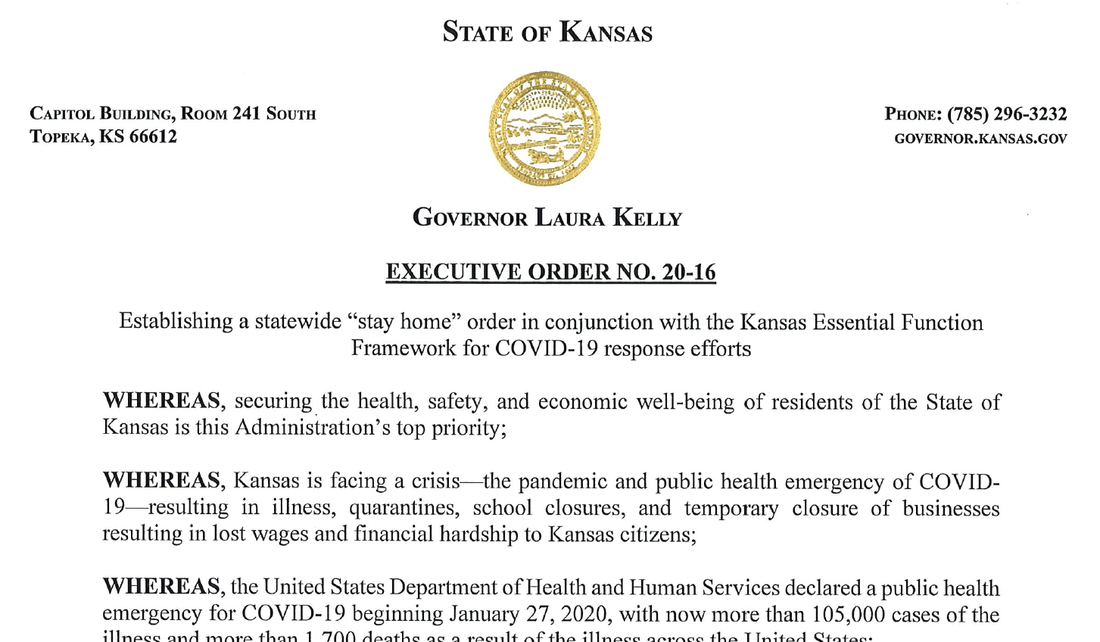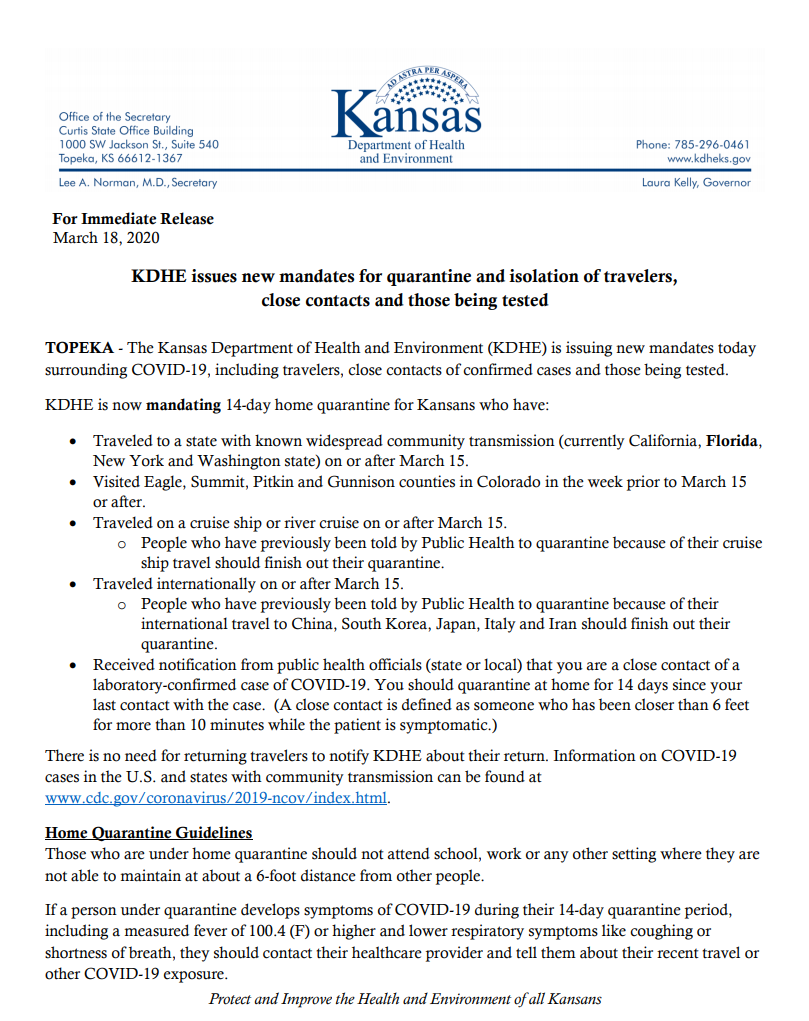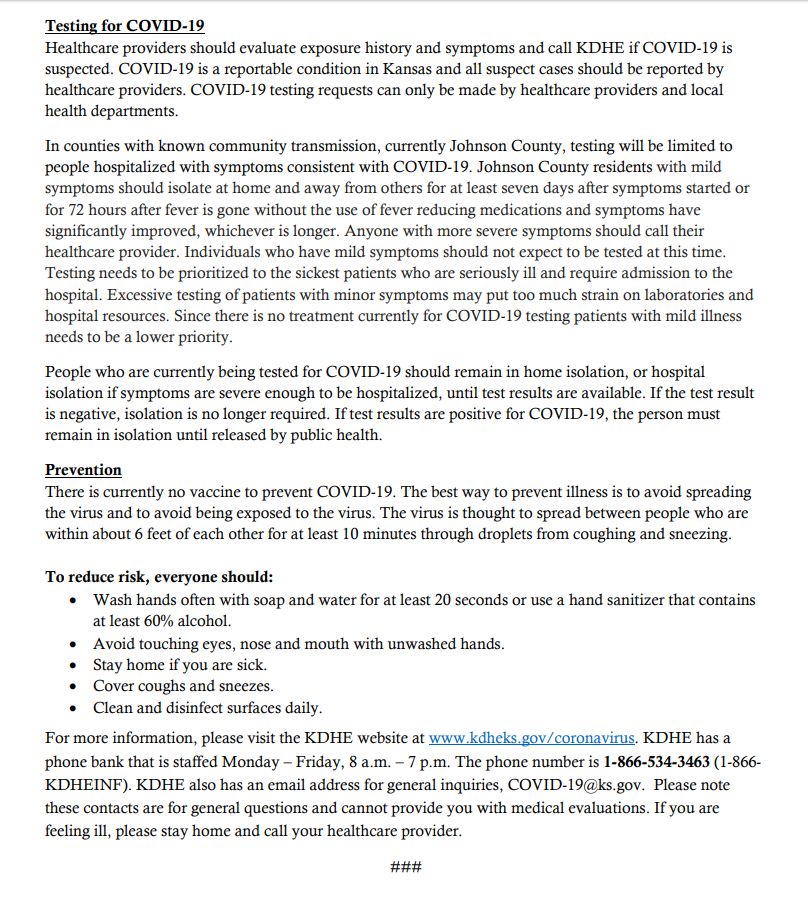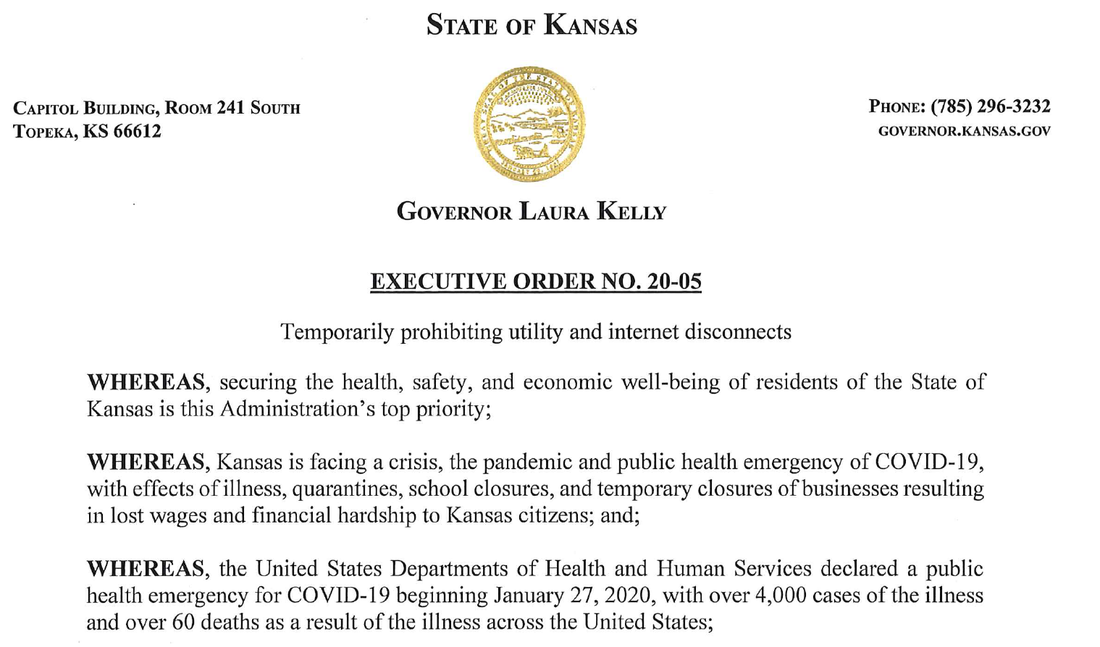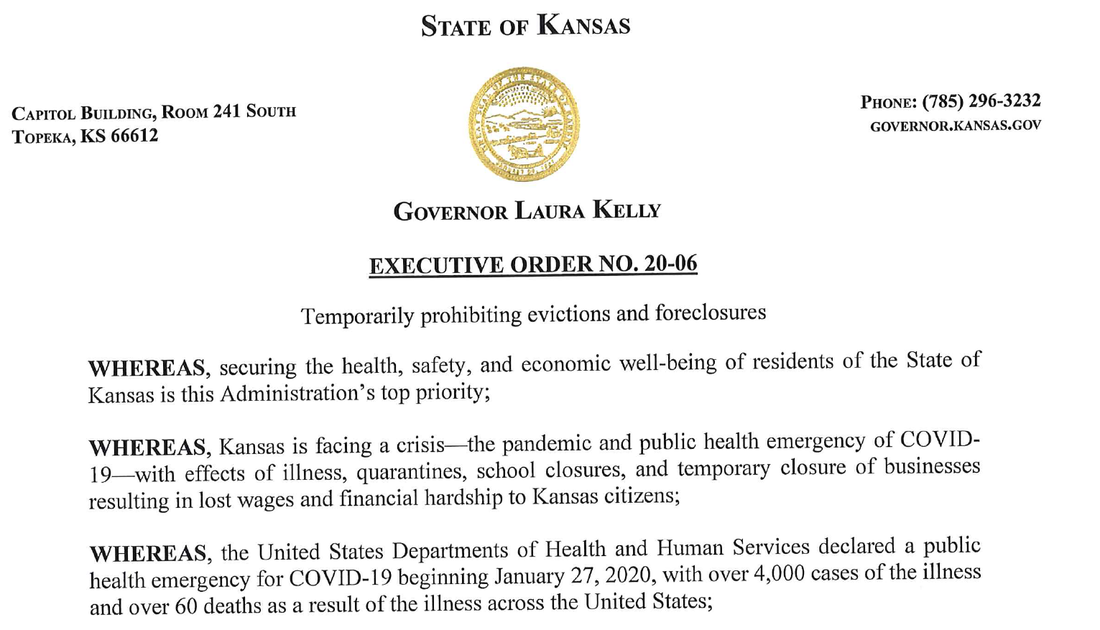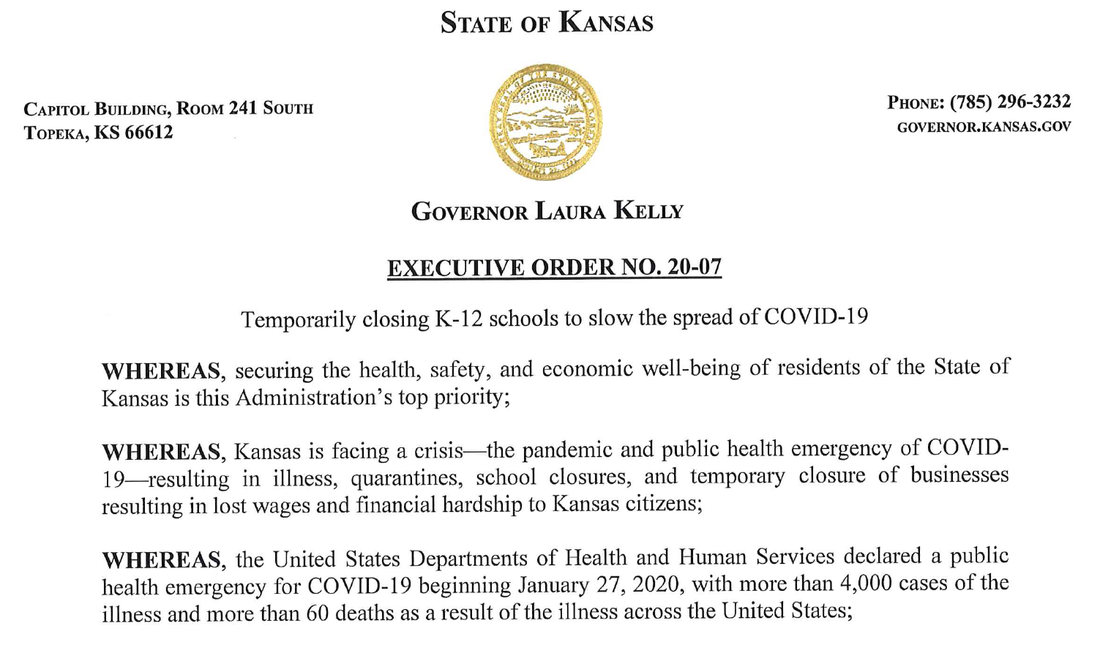Archived Press Releases >
|
Crawford County Health Department on earning CDC Full Recognition for your diabetes prevention program. This designation is reserved for programs that have effectively delivered a quality, evidence-based program that meets all of the standards for CDC recognition. (Read more) For Immediate Release August 27, 2020 Contact: Lauren Fitzgerald, Press Secretary [email protected] State Agencies Collaborate to Create COVID-19 Essential Worker Health Care Fund Health Care Assistance for Early Childhood Professionals and Other Essential Workers TOPEKA — Governor Laura Kelly, along with multiple state agencies, announced today a collaborative effort to allocate $8 million in federal funds Kansas received under the Coronavirus Aid, Relief and Economic Security (CARES) Act to cover health care expenses for early childhood professionals and other essential workers who contracted COVID-19. “The dedication and selflessness displayed by Kansas essential workers has been critical to our recovery efforts across the state in cities big and small and rural communities,” Governor Laura Kelly said. “They risk their health each and every day to help others and these funds make it possible for the state of Kansas to help cover expenses in the unfortunate cases when they contract COVID-19.” The Essential Worker Health Care Fund involves collaboration between the Kansas Department of Health and Environment (KDHE) as the lead entity, the Kansas Department for Children and Families (DCF), the Kansas Department for Aging and Disability Services (KDADS), and the Kansas Children’s Cabinet and Trust Fund (KCCTF). KDHE’s Special Health Care Needs (SHCN) program will oversee the funds and process applications. Applications will be available online and include a release of information to verify health status and allow sharing of information related to COVID-19 diagnosis and treatment. DCF’s “Hero Relief Program” website (http://ksherorelief.com/) will be the public-facing marketing and communications platform for the fund. The “Health Care Assistance” portal of the site went live August 24, so Kansans can start applying. Assistance will be available to essential workers in positions/fields including but not limited to:
In order to be considered, individuals must have a COVID-19 positive diagnosis and verify essential worker status. Assistance will be limited to qualifying medical expense payout of $25,000 for uninsured individuals (no health care coverage) and $15,000 for insured individuals (coinsurance/copays and deductibles). “In these challenging and uncertain times, the thing we all hold fastest to is our health,” Governor Laura Kelly said. “It’s time to show our gratitude and compassion to the workers and the families who need it most right now and who show their compassion for all of us every day.” In alignment with the Strengthening People and Revitalizing Kansas (SPARK) Committee goal of providing vulnerable populations with access to health services, KDADS, KDHE, DCF, and the KCCTF recommended the creation of a COVID-19 health care expenses relief fund for critical infrastructure and essential workers who contracted COVID-19. These workers are on the front lines of the pandemic, providing critical services that enable many Kansans to stay safe at home. Applicants must provide proof of employment as a qualifying essential worker during the pandemic. The SPARK Taskforce is charged with leading Kansas forward in recovery from the far-reaching effects of COVID-19. The SPARK Executive and Steering Committees, in conjunction with the Office of Recovery team, are responsible for the statewide distribution of CARES Act funding. Applications for more round two funding will be announced soon. For more information on eligibility and for instructions on how to apply, visit KSHeroRelief.com. For more information on COVID-19 visit: www.kdheks.gov/coronavirus ### |
|
More Archives +
Executive Order No. 20-31
Throughout Phase 1.5 the Governor will continue evaluating the state’s progress and, if appropriate, issue a new executive order moving the statewide baseline to Phase Two. Phase 1.5 will begin on May 18, 2020. (Read More Reopen-Kansas-Framework-v5-2 PDF)
Throughout Phase 1.5 the Governor will continue evaluating the state’s progress and, if appropriate, issue a new executive order moving the statewide baseline to Phase Two. Phase 1.5 will begin on May 18, 2020. (Read More Reopen-Kansas-Framework-v5-2 PDF)
KDHE has adjusted how they will be putting out daily counts for the State. They will no longer be sending out the PDF file that the Health Department has been posting daily. Instead the updates will be at the following website: https://public.tableau.com/profile/kdhe.epidemiology#!/vizhome/COVID-19Data_15851817634470/KSCOVID-19CaseData
The State has also updated their website around essential functions. Please visit the following website for details: https://governor.kansas.gov/kansas-essential-functions-faq/
The State has also updated their website around essential functions. Please visit the following website for details: https://governor.kansas.gov/kansas-essential-functions-faq/
For information on how to prevent the spread of the Coronavirus, please visit these websites.
http://www.kdheks.gov/coronavirus/index.htm
https://www.cdc.gov/coronavirus/2019-ncov/index.html
http://www.kdheks.gov/coronavirus/index.htm
https://www.cdc.gov/coronavirus/2019-ncov/index.html
For Immediate Release:
May 14, 2020
Governor Kelly adds new phase to “Ad Astra” plan
Kelly: COVID-19 metrics indicate progress, but caution still needed
This afternoon, Kansas Governor Laura Kelly signed Executive Order 20-32, which establishes a new phase to the “Ad Astra: Plan to Reopen Kansas.” The new “1.5” Phase, effective May 18, 2020, continues reopening efforts while preserving some data-driven restrictions necessary to prevent community transmission of COVID-19. (Read More)
May 14, 2020
Governor Kelly adds new phase to “Ad Astra” plan
Kelly: COVID-19 metrics indicate progress, but caution still needed
This afternoon, Kansas Governor Laura Kelly signed Executive Order 20-32, which establishes a new phase to the “Ad Astra: Plan to Reopen Kansas.” The new “1.5” Phase, effective May 18, 2020, continues reopening efforts while preserving some data-driven restrictions necessary to prevent community transmission of COVID-19. (Read More)
For Immediate Release
July 14, 2020
KDHE amends travel quarantine list
Arkansas, Alabama and South Carolina removed
TOPEKA – The Kansas Department of Health and Environment (KDHE) has removed three states from the quarantine list: Alabama, Arkansas and South Carolina. Additionally, KDHE has modified its international travel list from all international travel to just countries with a CDC Level 3 Travel Health Notice and restrictions on entry into the United States, plus Bahrain and French Guiana. Those traveling internationally are subject to CDC re-entry guidance and protocols.
This list is effective for all persons returning to or entering Kansas on the effective dates. The state will review/update this list every two weeks. A comprehensive list of those individuals needing to quarantine for 14 days includes visitors and Kansans who have:
Traveled to:
• Florida on or after June 29.
• Arizona on or after June 17.
• Been on a cruise ship or river cruise on or after March 15.
• International travel to Bahrain or French Guiana on or after July 14.
• International travel on or after July 14 to countries with a CDC Level 3 Travel Health Notice, including China, Iran, European Schengen area, United Kingdom, Republic of Ireland and Brazil. International travelers must follow CDC guidance and protocols.
Others needing to continue quarantining:
• Anyone subject to a travel-related quarantine for a state or country previously on the travel-related quarantine list must complete their 14-day quarantine period.
• Received notification from public health officials (state or local) that you are a close contact of a laboratory-confirmed case of COVID-19.
“The removal of states from our list isn’t cause for celebration,” said Dr. Lee Norman, KDHE Secretary. “We base our list on new case rates by population size and unfortunately, Kansas’ numbers are increasing significantly and our cases by population base have approached, even surpassed the states we had on our list. We must do better, Kansas. Practice social distancing, wear a mask, stay home if you’re sick, avoid large gatherings. Each one of us is responsible for our actions.”
States added to this list are determined by evaluating new cases in states over a two-week period, then adjusting for population size, giving a case per 100,000 population which can then be compared to the rate in Kansas. States with significantly higher rates (approximately 3 times higher) are added to the list.
Travel quarantines do not prohibit travel through Kansas. People from these locations may still travel through Kansas. If this is done, KDHE recommends limited stops, wearing a mask at rest stops or when getting gas and being 6’ from others when doing so. If the destination is Kansas, they would be required to quarantine upon arrival to their destination.
Critical infrastructure sector employees who have travelled to these destinations should contact their local health department regarding instructions for application of these quarantine orders while working. Critical infrastructure employees, such as public health, law enforcement, food supply, etc., need to have the staffing resources to continue serving Kansans so the local health department may allow a modified quarantine. Please note the only exemption for these quarantine mandates for critical infrastructure sector employees is work – they are not to go any other locations outside of work.
For more information on COVID-19, please visit the KDHE website at www.kdhe.ks.gov/coronavirus.
###
July 14, 2020
KDHE amends travel quarantine list
Arkansas, Alabama and South Carolina removed
TOPEKA – The Kansas Department of Health and Environment (KDHE) has removed three states from the quarantine list: Alabama, Arkansas and South Carolina. Additionally, KDHE has modified its international travel list from all international travel to just countries with a CDC Level 3 Travel Health Notice and restrictions on entry into the United States, plus Bahrain and French Guiana. Those traveling internationally are subject to CDC re-entry guidance and protocols.
This list is effective for all persons returning to or entering Kansas on the effective dates. The state will review/update this list every two weeks. A comprehensive list of those individuals needing to quarantine for 14 days includes visitors and Kansans who have:
Traveled to:
• Florida on or after June 29.
• Arizona on or after June 17.
• Been on a cruise ship or river cruise on or after March 15.
• International travel to Bahrain or French Guiana on or after July 14.
• International travel on or after July 14 to countries with a CDC Level 3 Travel Health Notice, including China, Iran, European Schengen area, United Kingdom, Republic of Ireland and Brazil. International travelers must follow CDC guidance and protocols.
Others needing to continue quarantining:
• Anyone subject to a travel-related quarantine for a state or country previously on the travel-related quarantine list must complete their 14-day quarantine period.
• Received notification from public health officials (state or local) that you are a close contact of a laboratory-confirmed case of COVID-19.
“The removal of states from our list isn’t cause for celebration,” said Dr. Lee Norman, KDHE Secretary. “We base our list on new case rates by population size and unfortunately, Kansas’ numbers are increasing significantly and our cases by population base have approached, even surpassed the states we had on our list. We must do better, Kansas. Practice social distancing, wear a mask, stay home if you’re sick, avoid large gatherings. Each one of us is responsible for our actions.”
States added to this list are determined by evaluating new cases in states over a two-week period, then adjusting for population size, giving a case per 100,000 population which can then be compared to the rate in Kansas. States with significantly higher rates (approximately 3 times higher) are added to the list.
Travel quarantines do not prohibit travel through Kansas. People from these locations may still travel through Kansas. If this is done, KDHE recommends limited stops, wearing a mask at rest stops or when getting gas and being 6’ from others when doing so. If the destination is Kansas, they would be required to quarantine upon arrival to their destination.
Critical infrastructure sector employees who have travelled to these destinations should contact their local health department regarding instructions for application of these quarantine orders while working. Critical infrastructure employees, such as public health, law enforcement, food supply, etc., need to have the staffing resources to continue serving Kansans so the local health department may allow a modified quarantine. Please note the only exemption for these quarantine mandates for critical infrastructure sector employees is work – they are not to go any other locations outside of work.
For more information on COVID-19, please visit the KDHE website at www.kdhe.ks.gov/coronavirus.
###
For Immediate Release (Read Press Release PDF)
May 12, 2020
KDHE adds state to travel quarantine list, removes others
TOPEKA – The Kansas Department of Health and Environment (KDHE) has added one state to the quarantine list: Maryland, and removed two states from the list: Colorado and Louisiana. This includes removal of the specific Colorado counties listed previously. This is effective for persons returning today, May 12, and moving forward. A comprehensive list of those individuals in Kansas needing to quarantine for 14 days includes those who have:
Traveled to:
• Maryland on or after May 12.
• Massachusetts and Rhode Island on or after April 30.
• Connecticut on or after April 6.
• Illinois or New Jersey on or after March 23.
• New York on or after March 15.
• Been on a cruise ship or river cruise on or after March 15.
• International travel on or after March 15. (Read More)
May 12, 2020
KDHE adds state to travel quarantine list, removes others
TOPEKA – The Kansas Department of Health and Environment (KDHE) has added one state to the quarantine list: Maryland, and removed two states from the list: Colorado and Louisiana. This includes removal of the specific Colorado counties listed previously. This is effective for persons returning today, May 12, and moving forward. A comprehensive list of those individuals in Kansas needing to quarantine for 14 days includes those who have:
Traveled to:
• Maryland on or after May 12.
• Massachusetts and Rhode Island on or after April 30.
• Connecticut on or after April 6.
• Illinois or New Jersey on or after March 23.
• New York on or after March 15.
• Been on a cruise ship or river cruise on or after March 15.
• International travel on or after March 15. (Read More)
Travel & Exposure Related Isolation / Quarantine
Those who have traveled to the following locations need to quarantine for 14 days after arrival in Kansas. This applies to both Kansas residents and those visiting Kansas:
Alabama
Arizona
Arkansas
Florida
South Carolina
Cruise ship or river cruise passengers
International travelers (Read More)
Those who have traveled to the following locations need to quarantine for 14 days after arrival in Kansas. This applies to both Kansas residents and those visiting Kansas:
Alabama
Arizona
Arkansas
Florida
South Carolina
Cruise ship or river cruise passengers
International travelers (Read More)
For Immediate Release
June 26, 2020
KDHE shares steps to protect health amid potential
air quality impacts from Sahara Dust
TOPEKA – The Kansas Department of Health and Environment (KDHE) wants to alert Kansans to a potential air quality impact from Saharan dust. The Saharan dust comes from the Sahara Desert in Africa, where storms can lift the dust into the atmosphere. Dust is picked up by trade winds and carried thousands of miles across the Atlantic and eventually to the U.S. The particulate matter from this event has the potential to impact Kansas.
Particulate matter can cause health problems, even in healthy individuals. Common health problems include burning eyes, runny nose, coughing and illnesses such as bronchitis. Individuals with respiratory issues, pre-existing heart or lung diseases, children and elderly may experience worse symptoms.
Steps to protect your health on days when particulate matter is present in your community include:
June 26, 2020
KDHE shares steps to protect health amid potential
air quality impacts from Sahara Dust
TOPEKA – The Kansas Department of Health and Environment (KDHE) wants to alert Kansans to a potential air quality impact from Saharan dust. The Saharan dust comes from the Sahara Desert in Africa, where storms can lift the dust into the atmosphere. Dust is picked up by trade winds and carried thousands of miles across the Atlantic and eventually to the U.S. The particulate matter from this event has the potential to impact Kansas.
Particulate matter can cause health problems, even in healthy individuals. Common health problems include burning eyes, runny nose, coughing and illnesses such as bronchitis. Individuals with respiratory issues, pre-existing heart or lung diseases, children and elderly may experience worse symptoms.
Steps to protect your health on days when particulate matter is present in your community include:
- Healthy people should limit or avoid strenuous outdoor exercise.
- People with respiratory or heart related illness should remain indoors.
- Help keep indoor air clean by closing doors and windows and running the air conditioners with air filters.
- Keep hydrated by drinking lots of water.
- Contact your doctor if you have symptoms such as chest pain, chest tightness, shortness of breath or severe fatigue.
On Friday, June 19th, the Crawford County Commissioners acting as the Board of Public Health swore in Dr. Timothy Stebbins as the new Crawford County Public Health Officer and Dr. Linda Bean as the Deputy Public Health Officer.
In addition to the roles Dr. Stebbins and Dr. Bean currently serve in the community, they will take on the additional responsibility of the Public Health Officer and Deputy Public Health Officer.
We are confident in the abilities of Dr. Stebbins and Dr. Bean to lead our community in their newly appointed roles. They will work closely with Rebecca Adamson, who is the current Crawford County Health Department Director.
All Health Department services and COVID-19 testing remain open and accessible to the public, for more information regarding those services, contact the Health Department at 620-231-5411.
In addition to the roles Dr. Stebbins and Dr. Bean currently serve in the community, they will take on the additional responsibility of the Public Health Officer and Deputy Public Health Officer.
We are confident in the abilities of Dr. Stebbins and Dr. Bean to lead our community in their newly appointed roles. They will work closely with Rebecca Adamson, who is the current Crawford County Health Department Director.
All Health Department services and COVID-19 testing remain open and accessible to the public, for more information regarding those services, contact the Health Department at 620-231-5411.
Dr. Linda Bean, DO, Deputy Health Officer for Crawford County
New health officer offers guidance for employers, employees to minimize spread of COVID-19 in Crawford County
One of Dr. Linda Bean’s first priorities as the new deputy health officer for Crawford County is to educate and create awareness among employers and employees in an attempt to mitigate the spread of COVID-19, which gained a foothold in the county last week.
First and foremost: it is important to isolate at home if 1) you show symptoms of COVID-19 (such as fever or chills, cough, difficulty breathing, extreme tiredness, muscle aches, headache, sore throat, diarrhea, or loss of taste or smell), or 2) you have been tested and are awaiting results, regardless of whether you have symptoms, until you get the results.
Currently, there are 192 identified active cases in Crawford County — the highest of any county in Southeast Kansas — after an outbreak at Sugar Creek Packing Plant last week. (Read More)
New health officer offers guidance for employers, employees to minimize spread of COVID-19 in Crawford County
One of Dr. Linda Bean’s first priorities as the new deputy health officer for Crawford County is to educate and create awareness among employers and employees in an attempt to mitigate the spread of COVID-19, which gained a foothold in the county last week.
First and foremost: it is important to isolate at home if 1) you show symptoms of COVID-19 (such as fever or chills, cough, difficulty breathing, extreme tiredness, muscle aches, headache, sore throat, diarrhea, or loss of taste or smell), or 2) you have been tested and are awaiting results, regardless of whether you have symptoms, until you get the results.
Currently, there are 192 identified active cases in Crawford County — the highest of any county in Southeast Kansas — after an outbreak at Sugar Creek Packing Plant last week. (Read More)
For Immediate Release
May 26, 2020
KDHE recommends self-quarantine for Kansans who traveled to Lake of the Ozarks
TOPEKA – The Kansas Department of Health and Environment (KDHE) is recommending voluntary 14-day self-quarantine for those Kansans who traveled to Lake of the Ozarks, Missouri, over the Memorial Day weekend and did not use protective measures, such as social distancing and face masks.
Over the holiday weekend, large crowds were reported at the Lake of the Ozarks with no protective practices being followed.
“The reckless behavior displayed during this weekend risks setting our community back substantially for the progress we’ve already made in slowing the spread of COVID-19,” Dr. Lee Norman, KDHE Secretary, said. “If you traveled to Lake of the Ozarks over the weekend, we urge you to act responsibly and self-quarantine to protect your neighbors, co-workers and family.”
While Lake of the Ozarks is not currently on the mandated travel list, KDHE urges those who traveled over the Memorial Day weekend to self-quarantine for 14 days upon return to Kansas.
A list of states on the mandated travel advisory is available at www.kdheks.gov/coronavirus.
###
May 26, 2020
KDHE recommends self-quarantine for Kansans who traveled to Lake of the Ozarks
TOPEKA – The Kansas Department of Health and Environment (KDHE) is recommending voluntary 14-day self-quarantine for those Kansans who traveled to Lake of the Ozarks, Missouri, over the Memorial Day weekend and did not use protective measures, such as social distancing and face masks.
Over the holiday weekend, large crowds were reported at the Lake of the Ozarks with no protective practices being followed.
“The reckless behavior displayed during this weekend risks setting our community back substantially for the progress we’ve already made in slowing the spread of COVID-19,” Dr. Lee Norman, KDHE Secretary, said. “If you traveled to Lake of the Ozarks over the weekend, we urge you to act responsibly and self-quarantine to protect your neighbors, co-workers and family.”
While Lake of the Ozarks is not currently on the mandated travel list, KDHE urges those who traveled over the Memorial Day weekend to self-quarantine for 14 days upon return to Kansas.
A list of states on the mandated travel advisory is available at www.kdheks.gov/coronavirus.
###
The Governor's stay at home order for Kansas has been extended until Sunday, May 3, 2020. The article is below.
https://www2.ljworld.com/news/2020/apr/15/kansas-stay-at-home-order-extended-to-may-3-as-covid-19-cases-continue-to-rise-state-death-toll-hits-76/
https://www2.ljworld.com/news/2020/apr/15/kansas-stay-at-home-order-extended-to-may-3-as-covid-19-cases-continue-to-rise-state-death-toll-hits-76/
"Individuals or entities who are uncertain whether they perform functions exempted from the prohibitions of this order may email [email protected] to determine whether their functions are deemed essential."
COVID-19 Guidance 20-16-2
Clarifying that Restaurants and Bars May Not Reopen for Dine-In Service (.pdf)
Clarifying that Restaurants and Bars May Not Reopen for Dine-In Service (.pdf)
Executive Order 20-20: Temporarily allowing notaries and witnesses to act via audio-video communication technology.
Executive Order 20-19: Extending professional and occupational licenses during the COVID-19 pandemic.
Executive Order No. 20-18, temporarily prohibiting mass gatherings of more than 10 people to limit the spread of COVID-19 and rescinding Ex Order 20-14
KDHE ADDS STATES TO TRAVEL QUARANTINE LIST
LOUISIANA AND COLORADO
LOUISIANA AND COLORADO
FOR IMMEDIATE RELEASE
MARCH 27, 2020
FOR MORE INFORMATION, CONTACT:
ASHLEY JONES-WISNER
[email protected]
KRISTI ZEARS
[email protected]
KDHE ADDS STATES TO TRAVEL QUARANTINE LIST
LOUISIANA AND COLORADO
TOPEKA – THE KANSAS DEPARTMENT OF HEALTH AND ENVIRONMENT (KDHE) HAS ADDED TWO NEW STATES TO THE QUARANTINE LIST: LOUISIANA AND COLORADO. PREVIOUSLY, JUST CERTAIN COUNTIES IN COLORADO WERE INCLUDED. THIS IS EFFECTIVE FOR PERSONS RETURNING TODAY, MARCH 27, AND MOVING FORWARD.
A COMPREHENSIVE LIST OF THOSE KANSANS NEEDING TO QUARANTINE FOR 14 DAYS INCLUDES THOSE WHO HAVE:
FOR MORE INFORMATION, PLEASE VISIT THE KDHE WEBSITE AT WWW.KDHEKS.GOV/CORONAVIRUS. KDHE HAS A PHONE BANK THAT IS STAFFED MONDAY – FRIDAY, 8 A.M. – 7 P.M. THE PHONE NUMBER IS 1-866-534-3463 (1-866-KDHEINF). KDHE ALSO HAS AN EMAIL ADDRESS FOR GENERAL INQUIRIES, [email protected]. PLEASE NOTE THESE CONTACTS ARE FOR GENERAL QUESTIONS AND CANNOT PROVIDE YOU WITH MEDICAL EVALUATIONS. IF YOU ARE FEELING ILL, PLEASE STAY HOME AND CALL YOUR HEALTHCARE PROVIDER.
###
MARCH 27, 2020
FOR MORE INFORMATION, CONTACT:
ASHLEY JONES-WISNER
[email protected]
KRISTI ZEARS
[email protected]
KDHE ADDS STATES TO TRAVEL QUARANTINE LIST
LOUISIANA AND COLORADO
TOPEKA – THE KANSAS DEPARTMENT OF HEALTH AND ENVIRONMENT (KDHE) HAS ADDED TWO NEW STATES TO THE QUARANTINE LIST: LOUISIANA AND COLORADO. PREVIOUSLY, JUST CERTAIN COUNTIES IN COLORADO WERE INCLUDED. THIS IS EFFECTIVE FOR PERSONS RETURNING TODAY, MARCH 27, AND MOVING FORWARD.
A COMPREHENSIVE LIST OF THOSE KANSANS NEEDING TO QUARANTINE FOR 14 DAYS INCLUDES THOSE WHO HAVE:
- TRAVELED TO LOUISIANA OR ANYWHERE IN COLORADO ON OR AFTER MARCH 27.
- TRAVELED TO A STATE WITH KNOWN WIDESPREAD COMMUNITY TRANSMISSION (CALIFORNIA, FLORIDA, NEW YORK AND WASHINGTON STATE) ON OR AFTER MARCH 15.
- TRAVELED TO ILLINOIS OR NEW JERSEY ON OR AFTER MARCH 23.
- VISITED EAGLE, SUMMIT, PITKIN AND GUNNISON COUNTIES IN COLORADO IN THE WEEK OF MARCH 8 OR AFTER.
- TRAVELED ON A CRUISE SHIP OR RIVER CRUISE ON OR AFTER MARCH 15.
- PEOPLE WHO HAVE PREVIOUSLY BEEN TOLD BY PUBLIC HEALTH TO QUARANTINE BECAUSE OF THEIR CRUISE SHIP TRAVEL SHOULD FINISH OUT THEIR QUARANTINE.
- TRAVELED INTERNATIONALLY ON OR AFTER MARCH 15.
- PEOPLE WHO HAVE PREVIOUSLY BEEN TOLD BY PUBLIC HEALTH TO QUARANTINE BECAUSE OF THEIR INTERNATIONAL TRAVEL TO CHINA, SOUTH KOREA, JAPAN, ITALY AND IRAN SHOULD FINISH OUT THEIR QUARANTINE.
- RECEIVED NOTIFICATION FROM PUBLIC HEALTH OFFICIALS (STATE OR LOCAL) THAT YOU ARE A CLOSE CONTACT OF A LABORATORY-CONFIRMED CASE OF COVID-19. YOU SHOULD QUARANTINE AT HOME FOR 14 DAYS SINCE YOUR LAST CONTACT WITH THE CASE. (A CLOSE CONTACT IS DEFINED AS SOMEONE WHO HAS BEEN CLOSER THAN 6 FEET FOR MORE THAN 10 MINUTES WHILE THE PATIENT IS SYMPTOMATIC.)
FOR MORE INFORMATION, PLEASE VISIT THE KDHE WEBSITE AT WWW.KDHEKS.GOV/CORONAVIRUS. KDHE HAS A PHONE BANK THAT IS STAFFED MONDAY – FRIDAY, 8 A.M. – 7 P.M. THE PHONE NUMBER IS 1-866-534-3463 (1-866-KDHEINF). KDHE ALSO HAS AN EMAIL ADDRESS FOR GENERAL INQUIRIES, [email protected]. PLEASE NOTE THESE CONTACTS ARE FOR GENERAL QUESTIONS AND CANNOT PROVIDE YOU WITH MEDICAL EVALUATIONS. IF YOU ARE FEELING ILL, PLEASE STAY HOME AND CALL YOUR HEALTHCARE PROVIDER.
###
Executive Order NO. 20-16
KDHE and KDA recommend voluntary reduction in burning
For Immediate Release
March 26, 2020
Kristi Zears
[email protected]
KDHE and KDA recommend voluntary reduction in burning
In response to the COVID-19 pandemic currently impacting all states, including Kansas, the Kansas Department of Health and Environment and the Kansas Department of Agriculture strongly encourage all land owners and managers to voluntarily reduce the number of acres that they intend to burn this spring.
“With the potential for this pandemic overwhelming the state’s medical facilities, any additional respiratory concerns that could be produced from breathing smoke from prescribed fire need to be mitigated,” Dr. Lee Norman, KDHE Secretary, said.
Common health problems related to smoke can include burning eyes, runny nose, coughing and illnesses such as bronchitis. Individuals with respiratory issues, including COVID-19, pre-existing heart or lung diseases, children and the elderly may experience worse symptoms.
With resources of the county emergency response staff already being taxed with COVID-19 response, it is important to minimize responses that would come with prescribed fire activity.
It is critical that land managers in areas included in the Smoke Model available online at ksfire.org consult the model if they do choose to burn. The model indicates the level at which a burn would contribute to urban area air quality problems. Secretary of Agriculture Mike Beam urges land managers to refrain from burning, especially if your area is predicted in the large (red) contribution range.
“Prescribed burning is a valuable land management tool in the efforts to fight invasive species and maximize land productivity, and this request should not be interpreted as an indictment of the practice of burning,” Beam said. “However, the circumstances surrounding the coronavirus pandemic have created a situation that calls for reducing burned acres this spring.”
For the latest information related to COVID-19, and to sign up for daily updates sent to your email inbox, visit the Kansas Department of Health and Environment’s COVID-19 Resource Center at www.kdheks.gov/coronavirus.
March 26, 2020
Kristi Zears
[email protected]
KDHE and KDA recommend voluntary reduction in burning
In response to the COVID-19 pandemic currently impacting all states, including Kansas, the Kansas Department of Health and Environment and the Kansas Department of Agriculture strongly encourage all land owners and managers to voluntarily reduce the number of acres that they intend to burn this spring.
“With the potential for this pandemic overwhelming the state’s medical facilities, any additional respiratory concerns that could be produced from breathing smoke from prescribed fire need to be mitigated,” Dr. Lee Norman, KDHE Secretary, said.
Common health problems related to smoke can include burning eyes, runny nose, coughing and illnesses such as bronchitis. Individuals with respiratory issues, including COVID-19, pre-existing heart or lung diseases, children and the elderly may experience worse symptoms.
With resources of the county emergency response staff already being taxed with COVID-19 response, it is important to minimize responses that would come with prescribed fire activity.
It is critical that land managers in areas included in the Smoke Model available online at ksfire.org consult the model if they do choose to burn. The model indicates the level at which a burn would contribute to urban area air quality problems. Secretary of Agriculture Mike Beam urges land managers to refrain from burning, especially if your area is predicted in the large (red) contribution range.
“Prescribed burning is a valuable land management tool in the efforts to fight invasive species and maximize land productivity, and this request should not be interpreted as an indictment of the practice of burning,” Beam said. “However, the circumstances surrounding the coronavirus pandemic have created a situation that calls for reducing burned acres this spring.”
For the latest information related to COVID-19, and to sign up for daily updates sent to your email inbox, visit the Kansas Department of Health and Environment’s COVID-19 Resource Center at www.kdheks.gov/coronavirus.
Press Release
For immediate release:
Date:
Crawford County Health Department WIC Program Now Available Without Physical Presence
For immediate release:
Date:
Crawford County Health Department WIC Program Now Available Without Physical Presence
Press Release
For immediate release:
Date:
Crawford County Health Department WIC Program Now Available Without Physical Presence
Physical presence requirement waived effective Monday, March 23, 2020.
During the COVID-19 pandemic, the Crawford County Health Department serving Crawford and Bourbon counties will continue to operate.
Current participants will continue to receive WIC benefits and new applicants will be assessed, certified and issued benefits.
Clinic operating hours and staff availability will be subject to local and state orders related to the pandemic. Currently, the Crawford County Health Department WIC Program is in operation at the following days and times:
Monday – Friday 8:30 am to 4:30 pm by appointment by phone only
Normally, participants and applicants of the program must be physically present to receive services.
Effective Monday, March 23, 2020, the USDA and the Kansas State Agency waived the physical presence requirement. This waiver applies to areas in which WIC clinics have been closed to the public or in areas that are under a current stay at home order. The physical presence waiver will also be used for those persons who are under quarantine, whether voluntary or involuntary.
WIC appointments may now be conducted using telephone, computer and other technology. Clinic staff will assess and certify applicants for eligibility and will issue food benefits remotely to those determined eligible.
Applicants and current participants should contact the WIC clinic to find out what options are available. Clinic locations and phone numbers are as follows:
Crawford County Health Department, Community Health Center of SEK in Pittsburg and Ft. Scott, Bourbon County Health Department and Girard WIC clinic. Phone: (620)231-5411
Information about other clinics is available at: http://www.kansaswic.org/families/WIC_county_map.html
Food benefits are purchased at approved grocery stores using an e-WIC card. Cards and program information may be issued to participants through a controlled physical pick up, such as a curbside pick-up process or cards and information may be mailed directly to participants. Local clinics will determine the most appropriate way to issue materials based on staffing and logistical resources.
WIC services include providing supplemental food benefits, nutrition education, breastfeeding support, and referrals to health and social services.
Currently, each woman and child receives healthy foods, including fresh fruits and vegetables with a retail value of about $37 per month and about $41 per month respectively. Infants who are not breastfed and receive infant formula receive infant formula with a retail value of approximately $152 per month.
Important: If you or anyone in your family have a fever, cough, or difficulty breathing, please call the local WIC office and reschedule your appointment. You may be able to complete your WIC appointment over the phone.
Additional details about the Kansas WIC Program can be found here: http://www.kansaswic.org/families/
Additional details about COVID-19 in the State of Kansas can be found here: www.kdheks.gov/coronavirus
###
Contact information:
Crawford County Health Department WIC Program
(620)231-5411
For immediate release:
Date:
Crawford County Health Department WIC Program Now Available Without Physical Presence
Physical presence requirement waived effective Monday, March 23, 2020.
During the COVID-19 pandemic, the Crawford County Health Department serving Crawford and Bourbon counties will continue to operate.
Current participants will continue to receive WIC benefits and new applicants will be assessed, certified and issued benefits.
Clinic operating hours and staff availability will be subject to local and state orders related to the pandemic. Currently, the Crawford County Health Department WIC Program is in operation at the following days and times:
Monday – Friday 8:30 am to 4:30 pm by appointment by phone only
Normally, participants and applicants of the program must be physically present to receive services.
Effective Monday, March 23, 2020, the USDA and the Kansas State Agency waived the physical presence requirement. This waiver applies to areas in which WIC clinics have been closed to the public or in areas that are under a current stay at home order. The physical presence waiver will also be used for those persons who are under quarantine, whether voluntary or involuntary.
WIC appointments may now be conducted using telephone, computer and other technology. Clinic staff will assess and certify applicants for eligibility and will issue food benefits remotely to those determined eligible.
Applicants and current participants should contact the WIC clinic to find out what options are available. Clinic locations and phone numbers are as follows:
Crawford County Health Department, Community Health Center of SEK in Pittsburg and Ft. Scott, Bourbon County Health Department and Girard WIC clinic. Phone: (620)231-5411
Information about other clinics is available at: http://www.kansaswic.org/families/WIC_county_map.html
Food benefits are purchased at approved grocery stores using an e-WIC card. Cards and program information may be issued to participants through a controlled physical pick up, such as a curbside pick-up process or cards and information may be mailed directly to participants. Local clinics will determine the most appropriate way to issue materials based on staffing and logistical resources.
WIC services include providing supplemental food benefits, nutrition education, breastfeeding support, and referrals to health and social services.
Currently, each woman and child receives healthy foods, including fresh fruits and vegetables with a retail value of about $37 per month and about $41 per month respectively. Infants who are not breastfed and receive infant formula receive infant formula with a retail value of approximately $152 per month.
Important: If you or anyone in your family have a fever, cough, or difficulty breathing, please call the local WIC office and reschedule your appointment. You may be able to complete your WIC appointment over the phone.
Additional details about the Kansas WIC Program can be found here: http://www.kansaswic.org/families/
Additional details about COVID-19 in the State of Kansas can be found here: www.kdheks.gov/coronavirus
###
Contact information:
Crawford County Health Department WIC Program
(620)231-5411
For Immediate Release
March 24, 2020
Kansas WIC Program Now Available Without Physical Presence
WIC Physical presence requirement waived effective Monday, March 23
March 24, 2020
Kansas WIC Program Now Available Without Physical Presence
WIC Physical presence requirement waived effective Monday, March 23
For Immediate Release
March 24, 2020
Kansas WIC Program Now Available Without Physical Presence
WIC Physical presence requirement waived effective Monday, March 23
During the COVID-19 pandemic, the Kansas WIC program will continue to operate. WIC is the nutrition program for low-income pregnant women, infants, and children from birth to age five, funded by the U.S. Department of Agriculture (USDA).
All current Kansas WIC participants will continue to receive benefits, and new applicants will be assessed, certified and issued benefits. Using telephone, computer and other technology, local clinic staff will be able to assess and certify applicants for eligibility and issue food benefits remotely to those determined eligible.
Typically, WIC participants and applicants of the program must be physically present to receive services. The USDA physical presence waiver is effective Monday, March 23 and expires May 31, 2020, or until extended. The waiver applies to areas impacted by WIC clinic closures and stay at home orders as well as to persons who are under quarantine, whether voluntary or involuntary.
Clinic operating hours and staff availability will be subject to local and state orders related to the pandemic. Applicants and current participants should contact their local WIC clinic to find out what options are available. Clinic locations are available online at: www.kansaswic.org/families/WIC_county_map.html. Contact your local health department for information on the nearest WIC clinic if you do not have access to the Internet.
More information about Kansas WIC
The Kansas WIC program provides services to an average of 47,000 program participants each month. The program is administered by the Kansas Department of Health and Environment through contracts with county health departments and three community health centers. There are 120 WIC clinics in Kansas where potentially eligible participants may apply for services. There are 359 stores in Kansas authorized to provide WIC foods to clients.
WIC services include providing supplemental food benefits, nutrition education, breastfeeding support, and referrals to health and social services. Currently, each woman and child receive healthy foods, including fresh fruits and vegetables with a retail value of about $37 per month and about $41 per month respectively. Infants who are not breastfed and receive infant formula receive infant formula with a retail value of approximately $152 per month.
Food benefits are purchased at approved grocery stores using an e-WIC card. The physical presence waiver allows eWIC cards and program information to be issued to participants through a controlled physical pick up, such as a curbside pick-up process or cards and information may be mailed directly to participants. Local clinics will determine the most appropriate way to issue materials based on staffing and logistical resources.
Information about the Kansas WIC program is located online at www.kansaswic.org.
###
March 24, 2020
Kansas WIC Program Now Available Without Physical Presence
WIC Physical presence requirement waived effective Monday, March 23
During the COVID-19 pandemic, the Kansas WIC program will continue to operate. WIC is the nutrition program for low-income pregnant women, infants, and children from birth to age five, funded by the U.S. Department of Agriculture (USDA).
All current Kansas WIC participants will continue to receive benefits, and new applicants will be assessed, certified and issued benefits. Using telephone, computer and other technology, local clinic staff will be able to assess and certify applicants for eligibility and issue food benefits remotely to those determined eligible.
Typically, WIC participants and applicants of the program must be physically present to receive services. The USDA physical presence waiver is effective Monday, March 23 and expires May 31, 2020, or until extended. The waiver applies to areas impacted by WIC clinic closures and stay at home orders as well as to persons who are under quarantine, whether voluntary or involuntary.
Clinic operating hours and staff availability will be subject to local and state orders related to the pandemic. Applicants and current participants should contact their local WIC clinic to find out what options are available. Clinic locations are available online at: www.kansaswic.org/families/WIC_county_map.html. Contact your local health department for information on the nearest WIC clinic if you do not have access to the Internet.
More information about Kansas WIC
The Kansas WIC program provides services to an average of 47,000 program participants each month. The program is administered by the Kansas Department of Health and Environment through contracts with county health departments and three community health centers. There are 120 WIC clinics in Kansas where potentially eligible participants may apply for services. There are 359 stores in Kansas authorized to provide WIC foods to clients.
WIC services include providing supplemental food benefits, nutrition education, breastfeeding support, and referrals to health and social services. Currently, each woman and child receive healthy foods, including fresh fruits and vegetables with a retail value of about $37 per month and about $41 per month respectively. Infants who are not breastfed and receive infant formula receive infant formula with a retail value of approximately $152 per month.
Food benefits are purchased at approved grocery stores using an e-WIC card. The physical presence waiver allows eWIC cards and program information to be issued to participants through a controlled physical pick up, such as a curbside pick-up process or cards and information may be mailed directly to participants. Local clinics will determine the most appropriate way to issue materials based on staffing and logistical resources.
Information about the Kansas WIC program is located online at www.kansaswic.org.
###
